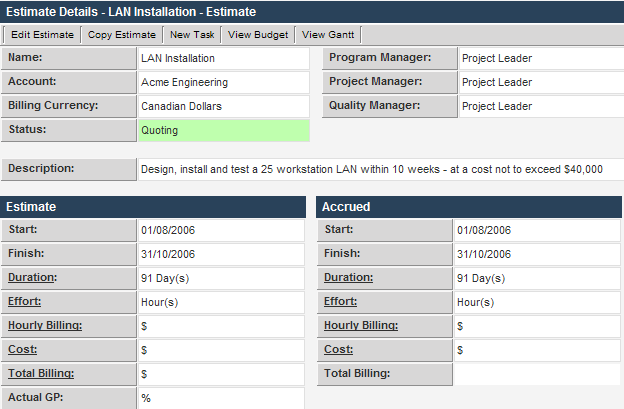Difference between revisions of "Creating a Task List"
From SmartWiki
Julia Decker (talk | contribs) |
(No difference)
|
Revision as of 09:57, 29 February 2008
For each task you can specify:
- Name – the name of the task.
- Description – an optional description of the task.
- Estimated Start Date – the anticipated start date of the task.
- Estimated End Date – the anticipated end date of the task.
- Estimated Effort – the anticipated amount of work required to complete the task.
- Estimated Cost – the anticipated cost for the task.
- Target – the target billing for the task.
- Accrue Hours – provides for time and effort to be tracked against the task before the budget is established. This feature is used to add the cost of preparing an estimate into the project.
Effort Verses Duration
It is important to recognize the difference between effort and duration.
- Effort is defined as the amount of work measured in hours or days required to complete a task.
- Effort can be specified at the task level, or specified when you assign a resource to a task. If you assign multiple resources, the effort will increase but not the duration.
- Duration is defined by the time elapsed between the start and the end of the task.
In this project you will use a team of resources to perform most of the work on the project, and therefore will need to assign the effort at the task level.
1. Click the My Estimates tab.
2. Click the project name.
The project details are displayed.
The tabs at the top of the project page control the following functions:
- Edit Estimate – open the project for editing.
- Copy Estimate – copy the current estimate to create a new estimate. Optionally, you can copy all tasks and resources into the new estimate.
- New Task – add a new task to the current estimate.
- View Budget – create or display the budget for the project. The first time you click this link you will be prompted to create a budget, subsequently the budget will be displayed.
- View Gantt – displays the project in a Gantt chart view.
